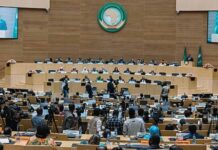
This week in Senegal, a handing over ceremony was held between the French and Senegalese militaries. The French military handed over its last two military bases in West Africa back to the Senegalese government, bringing to an end the last remnants of France’s permanent military presence in the region. This ceremony marked the culmination of a series of French military base relinquishments across West Africa, beginning in August 2022, when the first French military base in Mali was relinquished at the order of the military junta that had taken power in a coup the year prior.
The subsequent coups that took place over the next few years saw similar military juntas take power in Burkina Faso and Niger, riding a wave of anti-French sentiment. We would see similar actions taken by the military regimes in Burkina Faso and Niger, ordering the French troops stationed within their countries to withdraw. Subsequently, the French military would withdraw from Burkina Faso in February 2023. Later in the year, in December 2023, we saw the French military withdrawing from Niger.

This year, 2025, the trend has continued to spread across West Africa. This time round, rather than being confined to the military regimes of the Alliance of Sahel States, it has been West African civilian governments expelling French troops from their countries as well. In January, the French military would withdraw from its military bases in Chad. The following month, in February, Côte d’Ivoire would likewise see its French military bases being relinquished. And this month, in July, we have seen the withdrawal of French troops from Senegal.
The most common reason cited by these governments for ordering the withdrawal of French troops has been to assert the sovereignty of their nations. Many assert that having foreign military bases in their country goes against the principles of their national sovereignty. In general, across the region, growing anti-France sentiment has meant that the presence of French troops and French military bases within their former colonies has been a source of major controversy.
In the post-independence era, France has long sought to maintain a level of influence over its former colonies within Africa. This has been through economic and political means as well as militarily through its many military interventions. The French military, over the decades since its former colonies gained independence, has intervened militarily in civil wars, military coups, conflicts against terrorist groups or rebel groups in support of African leaders with whom France has had close ties.
It is therefore completely understandable why anti-French sentiment has been on the rise across West African nations over the years. Rather than truly relinquishing control over its African colonies, France has instead sought to indirectly maintain control over its former colonies by installing and propping up regimes that are willing to work in the interests of the French state. The kind of influence France has over its former colonies, post-independence, is really nothing like what exists in other countries across the continent that hadn’t been under French rule.
What perhaps makes this situation even worse is that, despite the fact that France is a part of the Western world and is a democratic nation itself, very often it has been very undemocratic regimes that France has propped up all across the continent. So while French citizens have had the privilege of living in democratic societies where they have the right to choose their leaders and their human rights and dignity are respected by their government, the same cannot be said for the citizens of countries that the French government has chosen to prop up across the African continent.
It is therefore completely understandable to see such high levels of anti-French sentiment rising across the region. France has, in essence, sought to maintain a neocolonial empire over West African nations decades after many of our nations gained independence. However, while keeping all that in mind, it is also important to acknowledge the potential dangers involved with the withdrawal of the French military from the region, particularly concerning the war against jihadist terrorist organisations operating across the region, particularly in the Sahel.
For over a decade, at this stage, many of our countries have essentially been in a constant state of war against these terrorist organisations operating in the region. This conflict has led to the deaths of tens of thousands of West Africans and has resulted in the displacement of millions. Not only that, this war against these jihadist groups has also led to the political instability that has rocked West Africa throughout the last few years, as military coups overthrew civilian governments in Mali, Niger, and Burkina Faso, citing the deteriorating security situation in their countries.
The French military has played a critical role, in some instances, in the fight against terrorist organisations in the region. Therefore, it is important that there isn’t any kind of security vacuum that is created as a result of their absence, which would lead to even more conflict and instability spreading across West Africa. We have already seen the negative repercussions of a lack of proper security planning, post-French military withdrawal, within the Alliance of Sahel States (AES) nations.
Following the withdrawal of French troops from AES nations, Russian mercenaries from the Wagner Group have been brought in to aid in their fight against terrorism, and their presence has done nothing to ameliorate their security woes. Wagner mercenaries have shown in their interventions across Africa that their priorities are protecting the leadership of the military juntas and their mining operations, not anything of national defence policy. Jihadist groups have managed to gain more ground and become more entrenched within the AES after the French withdrawal.
The optimal approach for West Africa would be to establish a regional force that collaborates to combat jihadist organisations. Every few years, we hear West African leaders discuss the possibility of the formation of such a regional force; however, we do not see any concrete action in that regard. This is one of the numerous instances of the ineffective nature of our governments, as West African leaders have permitted the rapid deterioration of the region’s security to persist for so long without action.
However, such a regional force would have to be led by the dominant regional power in West Africa, which is Nigeria. However, the Nigerian government has shown that it lacks the leadership capabilities to take on such a responsibility; moreover, Nigeria’s military has displayed that it cannot even maintain peace and stability even within its borders. A report by Amnesty International recently documented that over 10,000 Nigerians have died in attacks by armed groups in the first two years of President Tinubu’s rule, with the majority of deaths taking place in Benue and Plateau states.

As concerning as the report put out by Amnesty International is, it is almost certainly an underestimation of the true death toll that likely exists within Nigeria as a result of attacks by jihadist groups operating within Nigeria’s borders. In so many states in Nigeria today, there are so many communities in which the government does not have any presence whatsoever, where armed militias operate with impunity. If the Nigerian military cannot even deal with the insurgency in Nigeria, how can the military be of any aid to other West African nations should the need arise?
That’s not even to talk about the high levels of corruption rife throughout Nigeria’s government or the high levels of economic hardship felt throughout Nigeria’s society. The majority of Nigerian politicians are typically more concerned with how they can best enrich themselves as much as possible, rather than seeking to maintain peace and stability within Nigeria, let alone the entirety of West Africa. There would need to be a dramatic shift in the culture among Nigeria’s political class for the Nigerian government to be able to display any kind of real leadership within West Africa.
With the withdrawal of the French military from West Africa and with the gradual waning of French influence over its former colonies, it is clear that we are now entering a new era in the history of the region as a whole. It is important that this moment is met with the caution that it requires. The decisions, good or bad, made by West African leaders today will have ramifications that will likely span generations.
It is vital that our leaders work together and rise to the occasion to meet the security challenges faced by our region in a thoughtful manner. This is not merely a moment of transition, but an opportunity to build a more secure, self-reliant, and unified West Africa for generations to come.











